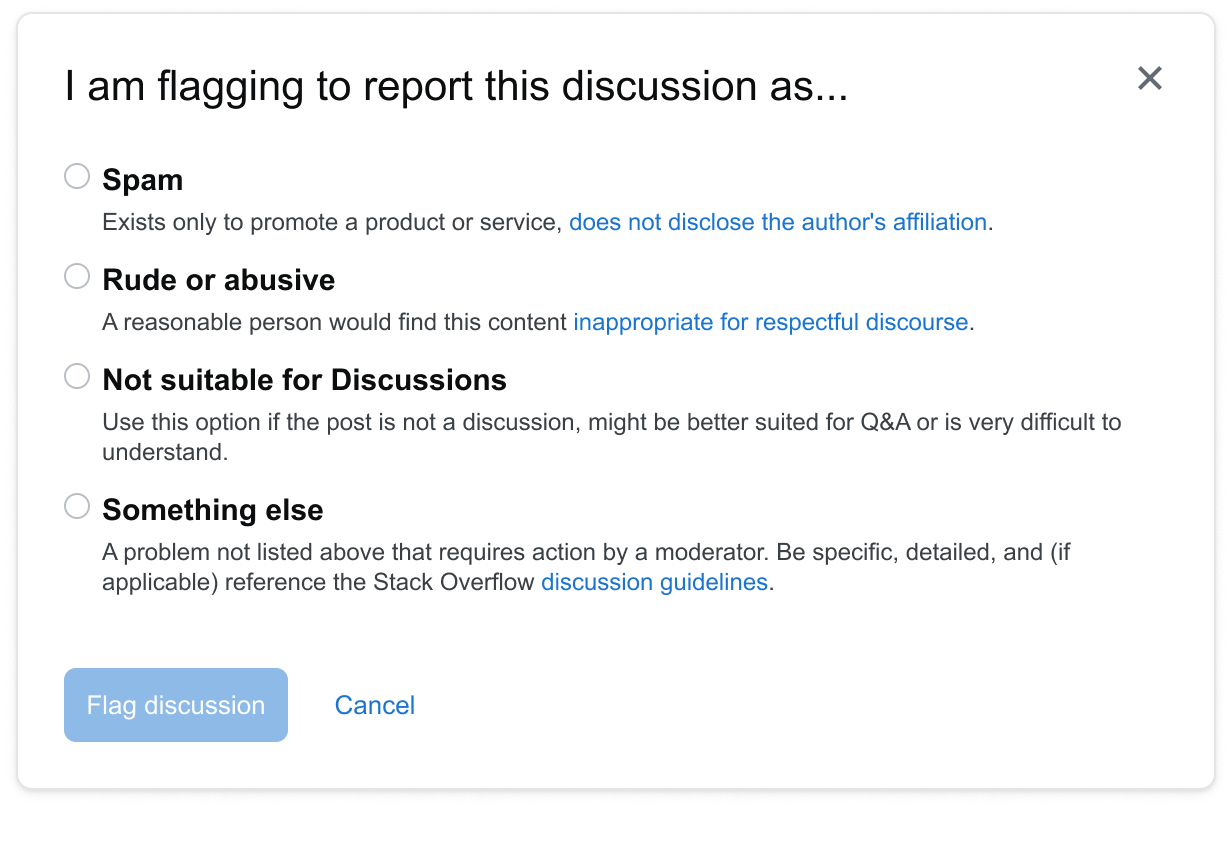The new Discussions space continues to take shape as more users discover it, reply to posts, and start new conversations. We are very thankful to the Discussions Moderators who are devoting time to managing the space and collaborating with the Community Team. Thanks as well to community members and Stack Overflow moderators who are participating and offering feedback.
Discussions provides a way for developers to learn or share a new perspective outside of the traditional question-and-answer space, with a lower barrier for engagement and covering a broader range of topics. Here are a few recent Discussions that have stood out as great conversations, with various perspectives being shared:
Below are details about recent changes and new experiments in Discussions. The goal of these efforts is to help users discover Discussions, encourage more contributions (both new posts and replies), and guide users toward making successful posts.
Feature updates
The default sort on the Discussions list page is now “Latest activity” instead of “Newest.” This allows active, older posts to be presented higher on the list at any given time, helping to balance out brand new posts that might not be as interesting to the community. An individual user’s selected sort option will still be retained for future visits. This change was released on February 28.
The right sidebar on Discussions pages will now feature a module that summarizes the guidelines, making it so users don’t need to visit another page to understand the basics. The full guidelines are linked in the top section of that module. This module can be viewed starting today on the Discussions list page, as well as the post display page and the post creation page. This update is effective today, March 7.
The flag reason “Should be a question” has been changed to “Not suitable for Discussions” to provide more clarity for users who are raising a flag. The secondary text for that option was also updated. Conversation on this post and with the Discussions moderators was helpful in moving this change forward. This update is effective today, March 7.
 The updated Discussions flag modal
The updated Discussions flag modal
Experiments
We’re looking at how to raise awareness of Discussions and prompt creation of new posts with two A/B tests:
The “Discussions” item on the left navigation will move to display under “Questions.” This test launched on March 5 and is being presented to 5% of users.
A “Start discussion” button will be displayed at the top of question pages next to “Ask Question.” This test will be presented to 5% of users and will begin as soon as data from the previous test reaches statistical significance. This is not a test of any proposed final design; it’s simply determining if this approach merits further exploration in the future.
For both tests, we’ll be looking specifically at whether more users click to start a discussion post (even if they do not end up publishing it).
We’re also making one change for all users as an experiment. For now, we have removed the Discussions downvote function and removed downvotes from the Discussions post score calculation. The reasoning behind this change is that there is not (yet) a clear shared definition of what a downvote means in Discussions.
Possible meanings of a downvote may be:
This is a low-quality post
I do not like the topic of this post
I disagree with the sentiment expressed
All are valid, but the lack of a shared definition can mean that the scores are a confusing signal. The prompts at the bottom of this post relate to this subject – what should a downvote in Discussions signify?
To be clear, we’re not questioning the usefulness of downvoting, in general, as a curation tool. This experiment is specific to the new content format of Discussions. Without a clear sense of what a downvote in Discussions signifies, users may (understandably) be applying norms and standards from Q&A. By removing downvoting, we are:
Allowing space for norms and standards for Discussions to evolve
Exploring how user interest in Discussions (as a whole) might be affected by only showcasing upvotes
Removing the downvote option encourages users to express concerns about a post via flagging and to provide constructive feedback (ways the post might be improved, etc.) by replying. If the absence of downvotes results in more flags and replies, that’s not a bad thing. With the accompanying update to the flag reasons (mentioned above), this should result in more informative curation.
This change affects all existing and future discussion posts. We’ll primarily be looking at post creation rate, number of replies, and post success rate (i.e. whether or not it is ultimately deleted) as we consider the effects of this change. Below are some questions about downvoting in Discussions, and we’re interested in your thoughts.
Reminder: Voting in Discussions has never affected user reputation
What should a downvote communicate in Discussions? Might that signal be better sent via private flag or public reply?
Can the upvote count alone communicate quality (consider the significance of no upvotes, versus one upvote, versus 10 upvotes)?